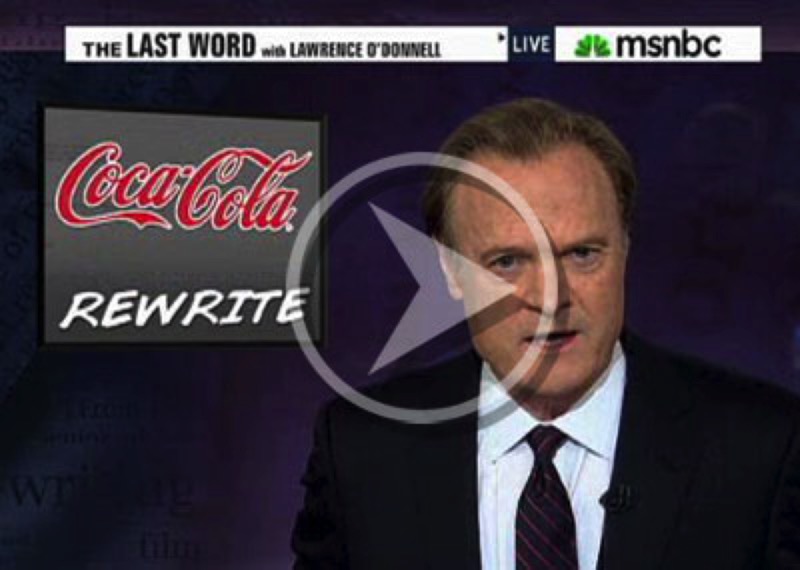Killer Coke Newsletter | January 11, 2012
Coke Continues Sinking to New Lows
Contents of the Newsletter
- Violent intrusion into the home of SINALTRAINAL VP Juan Carlos Galvis
- Killer Coke Campaign joins Shut Down School of the Americas Protest
- Occupy Wall Street
- Swedish journalists view 'The Coca-Cola Case' & do Q&A by Skype
- Tony Benn moderates 'The Coca-Cola Case' screening in London
- 'The Coca-Cola Case' screened in Taiwan
- Muhtar Kent & Penn State have something in common — Cover-ups
- Additional lawsuits against Coca-Cola
- Coca-Cola Abuse Articles
- Drinking This 'Popular Poison' is Worse than Smoking
- Coke losses battle to continue polluting Grand Canyon
- School lunches and child abuse, Washington-style
- Soda Companies Target Black and Latino Kids in High Numbers
- Black Group Targets Corporations Over Voting Laws
- Coca Cola Lies to Doctors?
- Activists Occupy Coca-Cola Factory In Kerala
- Coca-Cola accused of propping up notorious Swaziland dictator
- Coke helps save Canada's polar bears but exploits developing countries
- Video: 1,000 Days and a Dream (India)
- Angry Coke workers protest in Namibia and South Africa
1. Violent intrusion into the home of SINALTRAINAL VP Juan Carlos Galvis
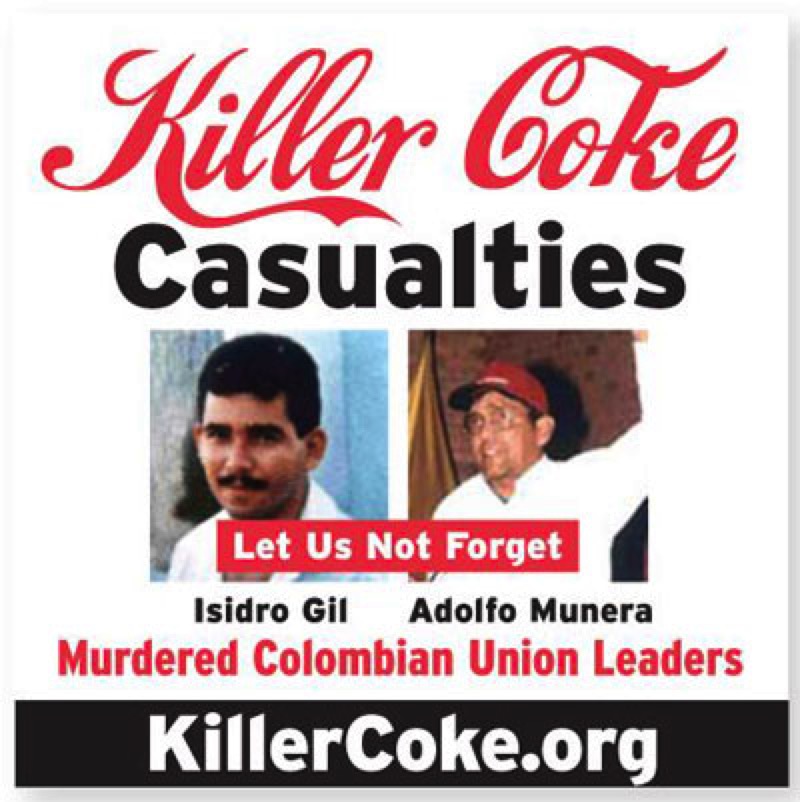
In our last newsletter, we posted an email we received from SINALTRAINAL, the main union representing Coca-Cola workers in Colombia. Below is further information we received from Colombia about the attack on Juan Carlos Galvis's family. Galvis is the SINALTRAINAL vice president and a plaintiff in the 2001 human rights abuse lawsuit against Coca-Cola and its bottlers in Colombia, who told us when visiting our Campaign office in New York: "If we lose this fight against Coke, first we will lose our union, next we will lose our jobs and then we will all lose our lives!"
# # #
On November 9, 2011, an armed man and woman forced entry into the Barrancabermeja home of SINALTRAINAL Vice President Juan Carlos Galvis. His wife, Jackeline Rojas Castaneda, is a Colombian human rights defender. She is a leading member of the Popular Women's Organization (Organizacion Femenina Popular, OFP) having worked with the organization for 20 years. The intruders threatened to kill her daughter and demanded information about her husband.
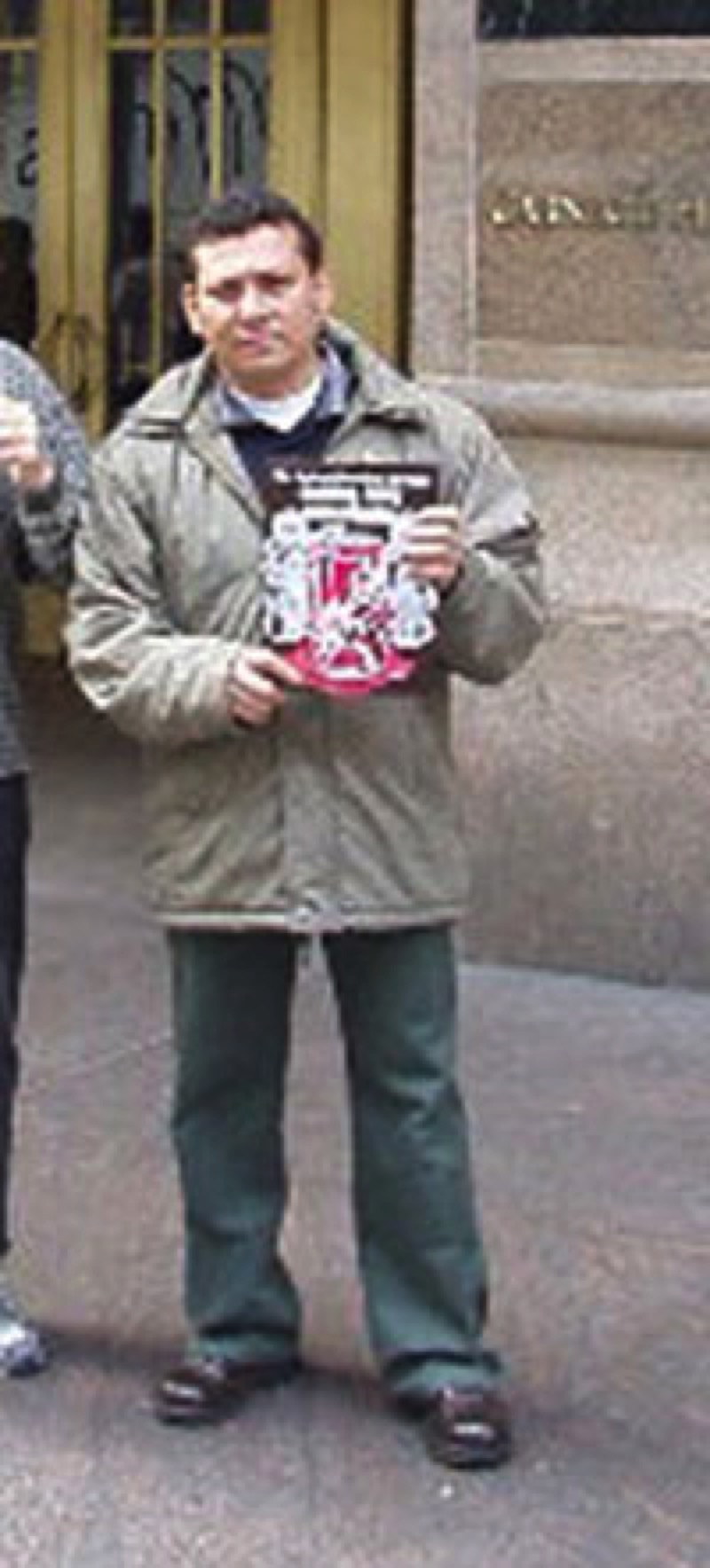
Juan Carlos Galvis leafleting in front of Coke Director Barry Diller's office in New York City in 2003.
The man and woman held Castaneda and her 15-year-old daughter at gunpoint in separate rooms. They told her that they would kill her daughter if she screamed or tried to call for help. She was tied up; gagged and red paint was sprayed on her body and clothes. Red paint was sprayed on photos showing Juan Carlos Galvis and "son of a bitch" (HP perro) and (HP perra) was daubed on the walls.
The attackers repeatedly demanded information on the whereabouts of her son and her husband, who is a director of the National Trade Union of Food Workers (Sindicato Nacional de Trabajadores del Sistema Agroalimentario, SINALTRAINAL). He is also a member of the executive committee of the Santander Department branch of the Trade Union Congress (Central Unitaria de Trabajadores, CUT).
In addition to the attack, two laptops, USB sticks, mobiles and documents were taken from Castaneda's house. These contained information about Galvis's work. On 10 November, Castaneda went to report the attack at the Attorney General's Office. Her complaint was not admitted initially after staff at the Attorney General's Office claimed she had invented the attack.
Jackeline Rojas Castaneda and Juan Carlos Galvis have been subject to repeated paramilitary death threats over the last 10 years. In the last month unknown persons have tried to force their way into their house on at least two previous occasions. Both Castaneda and Galvis have received several threats, including death threats over the years.
The OFP was founded in 1972 and has been working to promote women's human rights in the Magdalena Medio region, including Barrancabermeja, Santander Department. The members of the OFP have been victims of several threats and attacks.
"The constant pressure of driving around with bodyguards waiting for the next death threat has clearly gotten to him...
" 'It is tough,' [Galvis] says. 'We are on the brink of death, but we keep surviving. We bring in new members to the union, but the company fires them. If it weren't for international solidarity, we would have been eliminated long ago. That is the truth.' "
From "The Coke Machine" by Michael Blanding.
Many women human rights defenders, including community and social leaders, continue to be threatened and killed because of their work in favor of women's rights and against violence. They are not only targeted in retaliation for their work as human rights defenders or as community and social leaders, but also in an effort to silence them when they expose abuses. Over the last few years, women human rights defenders and community leaders working with forcibly displaced communities and those campaigning for the restitution of stolen lands have also been the target of threats and killings, mainly by paramilitaries. Some of these women were also victims of sexual violence.
SINALTRAINAL is a trade union founded in 1982 to defend and promote the labor rights of workers in the food industry. Since its creation, at least 22 SINALTRAINAL members have been killed or forcibly disappeared by paramilitaries, either acting alone or operating in collusion with the security forces; dozens have been victims of attacks or have received death threats. The film, "The Coca-Cola Case," documents many of these murders and accuses Coca-Cola of complicity in those murders.
In recent years, SINALTRAINAL has been involved in a number of labor disputes, often involving large multinational companies. These disputes have often coincided with reports of threats and attacks against members of the union, mainly by members of the security forces or paramilitary groups.
More than 2,000 trade unionists have been killed and 138 have been victims of enforced disappearance in Colombia over the last two decades. In 2010, at least 51 trade unionists were killed, compared to 39 in 2007.
In the course of Colombia's long running armed conflict, human rights defenders and trade unionists have been particularly vulnerable to threats and killings. Most of these attacks are attributed to paramilitary groups, often working with multinational corporations.
2. Killer Coke Campaign joins Shut Down School of the Americas Protest
a. Report from the Shut Down SOA Protest
For the third year in a row, organizers with the Campaign to Stop Killer Coke, Ian Hoffmann, Lew Friedman and Ray Rogers, joined thousands of students, activists, union members and people from interfaith communities to support the protest to shut down the School of the Americas (SOA).
The SOA, renamed the "Western Hemisphere Institute for Security Cooperation," but better known as the School of the Assassins, is a U.S. military training school for Latin American soldiers located in Ft. Benning, Georgia. The school is synonymous with torture and military repression around the world. Its graduates have long been associated with military coups, paramilitary death squads, human rights abuses and the suppression of popular movements. Hundreds of thousands, according to SOA Watch, have been tortured, raped, murdered and "disappeared" by those trained at the SOA.
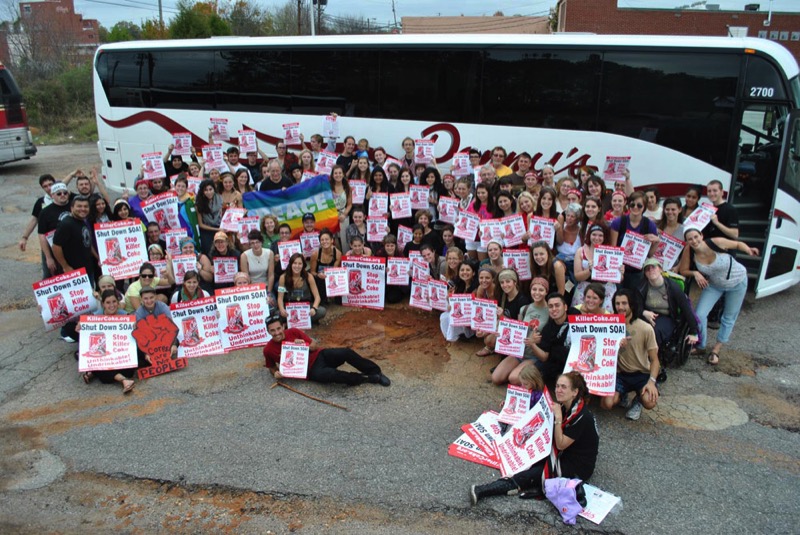
A contingent of two busloads of students from the University of Western Ontario and other London, Ontario, Canada, students heading back to Canada with "Shut Down SOA/Stop Killer Coke" posters and Stop Killer Coke literature.
A 2001 lawsuit, SINALTRAINAL, et al v, The Coca-Cola Co., et al, charged that Coca-Cola's bottlers in Colombia: "contracted with or otherwise directed paramilitary security forces that utilized extreme violence and murdered, tortured, unlawfully detained or otherwise silenced trade union leaders..."
"The U.S. government has trained over 10,000 of Colombia's military troops at the School of the Americas...SOA training manuals, which the Pentagon was forced to turn over in 1996, show that the U.S. encouraged these troops to engage in torture and murder of those who, inter alia, do 'union organizing and recruiting'; pass out 'propaganda in favor of the interests of the workers', and sympathize with demonstrators or strikers.'
"As a consequence of the official vilification of trade unions by the Colombian and U.S. governments as well as corporations operating in Colombia, Colombia has led the world in the number of murders of trade unionists."
The campaign distributed more than twelve thousand pieces of literature and thousands of posters and was met with overwhelming support, as in years past. Ray and Ian spoke to a packed audience in our annual SOA workshop. Students attending the workshop came from schools across North America, most of them Coca-Cola campuses. They brought back packs of our literature to their campuses. Among the universities and colleges included were:
- Bates College
- Beloit College
- Binghamton University (SUNY)
- Brebuef Jesuit Preparatory School
- DePauw University
- Georgia State University
- Holy Names University (Oakland, CA)
- Kings College
- Loyola University
- McPherson College
- Newman University
- Notre Dame De Namur
- Richmond High School (CA)
- St. Catherine University
- University of Georgia
- University of Kansas
- University of Western Michigan
- University of Western Ontario
- Warren Wilson College
- Webster University
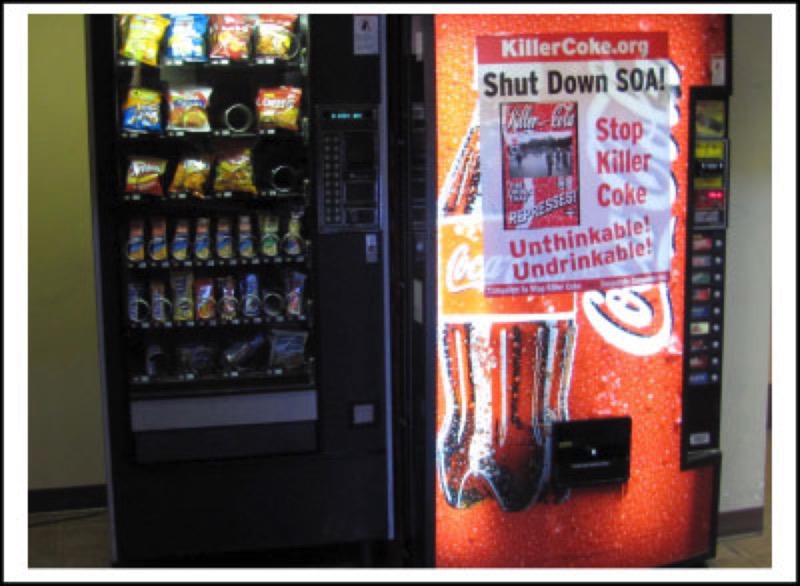
Students from schools with Coke contracts returned to their respective campuses with the knowledge, enthusiasm and literature necessary to get Killer Coke campaigns off the ground.
During the event, Lew staffed the Stop Killer Coke tables and spoke to participants in the convention center. Jeffrey Wright, former employee of Coca-Cola and author of "What Coca-Cola Did to Stop the Union from Coming In: Revealing Secrets Inside Corporate Scandals," also staffed our tables, spoke to participants and sold numerous copies of his book.
Members of the Campaign attended the Sunday morning procession at the gate of Ft. Benning, the military post that houses the School of the Americas. Marching were members of the United Auto Workers, Vets for Peace, many religious and political groups and numerous high school, university and college students and professors.
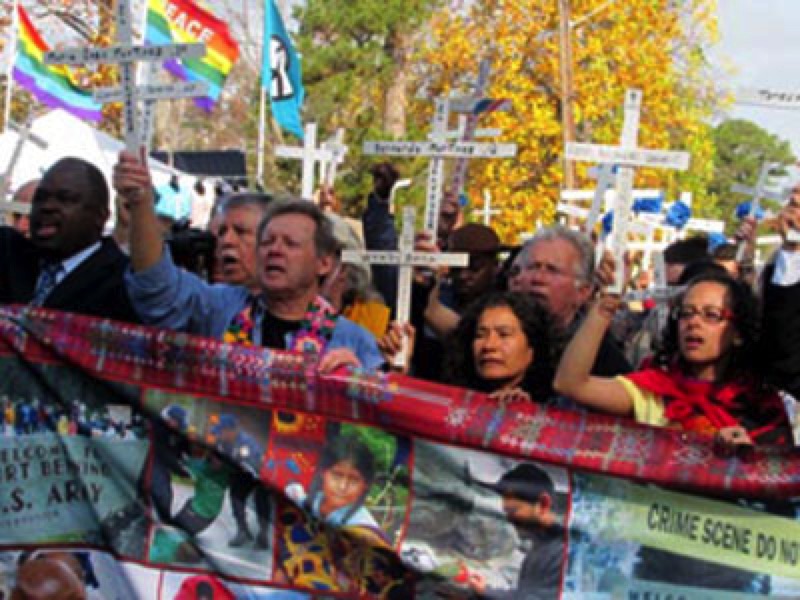
Sunday morning procession led by Father Roy Bourgeois and actor Martin Sheen.
As we left Ft. Benning, we noticed that none of the vendors on the side of the road were carrying Coca-Cola products. The vendors learned last year that no one wanted to purchase Coke beverages that are linked to human rights abuses in Latin America. We noticed that they carried Faygo, one of our listed alternatives to Coke.
For information on the School of Americas, please visit: SOAW.org.
b. Links Between SOA and Coca-Cola
On the website of
Western Hemisphere Institute for Security Cooperation (WHINSEC)
aka School of the Americas/School of the Assassins (SOA)
there is a description of its Board of Visitors:"When Congress passed the Defense Authorization Bill for 2001 and President Bill Clinton signed it into law, WHINSEC was created. The law called for a federal advisory committee — the Board of Visitors (BoV) — to maintain independent review, observation, and recommendation regarding operations of the institute. The 14-member BoV includes members of the Senate and House Armed Services Committees, representatives from the State Department, U.S. Southern Command, U.S. Northern Command, the U.S. Army Training and Doctrine Command, and six members designated by the Secretary of Defense. These six members include representatives from the human rights, religious, academic, and business communities. The board reviews and advises on areas such as curriculum, academic instruction, and fiscal affairs of the institute. Their reviews ensure relevance and consistency with US policy, laws, regulation, and doctrine."
For the past two years, the chair of the board has been Dr. Johanna Mendelson Forman who is a senior associate of CSIS Americas Program. CSIS, the Center for Strategic and International Studies is chaired by Coca-Cola Board Member Sam Nunn. Also on the board of CSIS is Muhtar Kent, the Chairman and CEO of The Coca-Cola Co., as well as E. Neville Isdell, the Company's former Chairman and CEO.
The CSIS is also heavily linked to the oil industry since Sam Nunn is on the board of Chevron and Rex Tillerson, Chair and CEO of Exxon Mobil, is on the board of CSIS.
The Vice-Chair of the Board of Visitors is Dr. Joseph Palacios, who is an assistant professor at the Center for Latin American Studies, a part of Georgetown University's Edmund A. Walsh School of Foreign Service. Coca-Cola Board Member Donald McHenry is a Professor in Practice of Diplomacy at the Edmund A. Walsh School of Foreign Service. McHenry has been a director of The Coca-Cola Company since 1981. Georgetown University is a Coca-Cola campus to the chagrin of many students at the university.
3. Occupy Wall Street
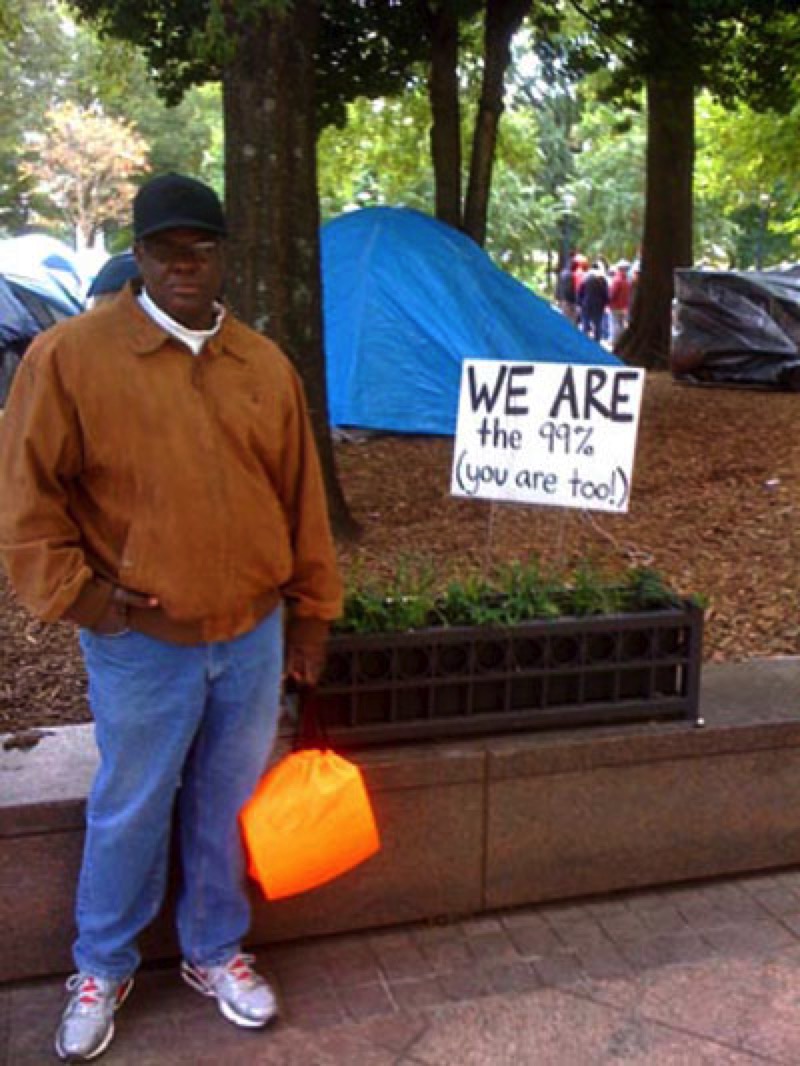
Jeffrey Wright, author of "What Coca-Cola Did to Stop the Union from Coming In," at Occupy Atlanta.
In our last newsletter , we noted that members of our campaign had been supporting the Occupy Wall Street movement that operated out of Zuccotti Park (renamed Liberty Park by the Occupy movement) in New York City. Recently at a meeting in Hawaii, attended by Pres. Obama and a slew of world leaders, Makana, who has sung at the White House, sang, "We Are the Many," a song in support of the international Occupy movement:
"Ye come here, gather 'round the stage
The time has come for us to voice our rage
Against the ones who've trapped us in a cage
To steal from us the value of our wage...
"We'll occupy the streets
We'll occupy the courts
We'll occupy the offices of you
Till you do
The bidding of the many, not the few"
We Are The Many - Makana
Watch Video
4. Swedish Journalists view 'The Coca-Cola Case' & do Q&A by Skype
On December 7, 2011, the Swedish Union of Journalists screened "The Coca-Cola Case" in Stockholm Sweden.
Campaign to Stop Killer Coke Director Ray Rogers was able to participate in the discussion via Skype and responded to many questions. He asked that the Union of Swedish Journalists pass a resolution to ban all Coke beverages from the union's facilities and functions and urged them to investigate and report on the Company's worldwide labor, human rights and environmental abuses, something that most of the American press has shown a reluctance to do.
5. Tony Benn moderates 'The Coca-Cola Case' screening in London
The London Socialist Film Co-Op screened "The Coca-Cola Case" on Sunday 11 December at the Renoir Cinema. Although it is hard to get people to screenings at 11am, a large audience of 127 attended, 53 of whom were not members of the LSFC. This was the second screening of the film in England and we were helped to promote it by the South East Regional TUC, the Campaign for Press and Broadcasting Freedom and by a number of socialist organisations, who did so mainly because Tony Benn was leading the discussion, but also because the film was felt to be important. The film was programmed as a free event because of some initial confusion over obtaining it, but the audience donated generously and the costs of the cinema and film hire were met.
The Coca-Cola Case was received with enthusiastic applause and Tony Benn opened the discussion, by saying he had seen the film twice on DVD and was now seeing it for the third time. He said The Coca-Cola Case was a powerful film that should be widely screened. He was both enlightened and depressed by the film, most people saw Coca Cola as just a fizzy drink and for him, someone known as a tea drinker who did not take alcohol, as a useful alternative
Questions were taken four at a time from the audience and the panel then replied. The audience seemed stunned by what they had seen and most of the questions related to what could be done. One person spoke of being involved in the Campaign to Stop Killer Coke at the University of Michigan, another wanted to know what had happened in Colombia since its making and people mentioned that they were aware of Coca Cola's crimes in India, but not in Latin America and elsewhere.
Tony replied that there was a need to spread information about the nature of The Coca Cola Company to counteract its propaganda. He said that the film must be viewed by as many people as possible and that there should be continuity between seeing the film and action. He reminded the audience that Coca Cola was a sponsor of the London Olympics and asked us to consider what action could be taken around the Olympics to highlight the Company's wrongs.
A member of the audience mentioned the opposition to Dow Chemical's Olympic sponsorship, because of its involvement in Bhopal and wondered if there were any anti-DOW groups in the UK who could be contacted about joint action. The Coca-Cola Case was shown with a short film about village life in India and parallels were drawn between the two films. The audience was told of attacks on trade unionists and political activists in India by Corporations keen to buy up land and drive villagers out.
Tony Benn said The Coca-Cola Case must be seen in the run up to and during the Olympics. He spoke about the power of Corporations, how as a government minister he was able to win concessions from BP because they wanted access to North Sea oil, but Coca Cola's corporate power rested on sugar and water. He also spoke of a media frightened by the power of Corporations into not giving out information. He mentioned hope on a number of occasions during the discussion and had said trade unions were involved in Colombia. He ended the discussion on a positive note telling the audience once again to have hope because we can defeat these people
The Coca-Cola Case is available for theatre screening in the UK from Dogwoof. They can arrange demonstration screenings if NGOs or other organisations are considering it for their film programmes. For home viewing, it can be downloaded to iTunes from Dogwoof's website and they hope to have DVDs for sale in 3-6 months.
When the DVD is available, the LSFC will sell it on its stand at future screenings. The LSFC will give its members details of the Campaign to Stop Killer Coke's website in its next newsletter.
Submitted by Ann O'Brien
6. 'The Coca-Cola Case' screened in Taiwan
"The Coca-Cola Case" was shown on Sunday, December 4 in Hsinchu City, Taiwan, at the Image museum and on Thursday, December 22 at Dong Hwa University at Hualien City in Taiwan.
"The Coca-Cola Case" kicked off the Taiwan International Labor Film Festival on Oct. 20th and had been translated into Mandarin.
7. Muhtar Kent and Penn State have something in common — Cover-ups
"If you're always focused on promoting the brand and there's no scrutiny, that leads to covering up," said E. Paul Durrenberger, an anthropology professor. This quote published in The New York Times ["Rich in Success, Rooted in Secrecy," Nov. 22, 2011] was directed at the Penn State child abuse scandal.
At the April 2011 Coca-Cola annual shareholders meeting, Coke CEO and Chair Muhtar Kent denied that there were any lawsuits in Mexico or Guatemala pending against Coca-Cola; he denied that aspartame was a dangerous ingredient in diet beverages and he denied that BPA in beverage cans was dangerous. Former Coca-Cola CEOs Douglas Daft and E. Neville Isdell also lied and covered up the Company's human rights abuses.
These denials focusing on protecting the brand led to Campaign Director Ray Rogers calling out: "You are a liar! You are a liar!"
Ray Rogers statement at the 2011 Coca-Cola shareholders meeting
A few years ago we published a quote from the director of the "Constant Gardener," in which he discussed how corporate policymakers will deny, that is, lie, when they are caught in corporate abuses.
Fernando Meirelles, Director of the film, "The Constant Gardener," said in the Bonus Features of the DVD: "We met with the chairman of a big pharmaceutical company. The first thing he told us was "This is bullshit! We just help people.' (referring to accusations that pharmaceutical companies test drugs in Africa resulting in deaths of patients)
"...Suppose you were testing a drug here and some people died, what would you do? Would you go public? Would you try to cover? He said: 'Yes, I would have to cover.'
"Well, that's my plot. I was really impressed. I never expected the chairman of a company would say this. He was really honest. He said: 'I would have to cover.' "
Don't these quotes remind you of Muhtar Kent and the policymakers of The Coca-Cola Company?
8. Additional lawsuits against Coca-Cola
a. Coca-Cola Sued for California Labor Law Violations
"BISNAR CHASE Employment Attorneys Cite Multiple California Labor Law Infractions," InsuranceNewsNet, Nov. 10, 2011
Read Article"The California employment attorneys of BISNAR CHASE today announced they have filed a class action lawsuit against Coca-Cola and its affiliates for allegedly violating multiple California labor laws (Case # BC469212) .
"The case against Coca-Cola Enterprise, Inc., BCI Coca-Cola Bottling Company of Los Angeles, and BCI Coca-Cola Bottling Company, with facilities in and around Los Angeles County and other counties within the state, was brought by plaintiffs Timothy Sulu and Jonathan Verdugo for alleged labor law violations against both men and other Coca-Cola employees - roughly 1,500 in all - beginning in September 2007."
b. "Family sues Coke over assets once seized by Egypt's anti-Jewish campaign," posted on November 15, 2011 at 1:30pm by Sharona Schwartz
Read Article"...one case bringing light to the issue will be argued in the Second Circuit Court of Appeals in New York City between a Jewish family once bullied into emigrating from Egypt and the Coca-Cola Company which later bought part of a company sitting on the Jewish family's property. The property had years before been seized by the Egyptian government during an anti-Jewish campaign...
"One judge already fined Coca-Cola $15,725 for failing to respond to Bigio attorney discovery requests for information, according to family lawyers. The Bigios contend this is just one example of the corporation's 14-year effort to "extend this litigation endlessly" raising multiple technicalities with the hopes the Bigios will drop the case from sheer exhaustion."
More information about the Bigio Suit
c. "Native American files racial discrimination lawsuit against Coca-Cola" 10/24/2011 By Michelle Keahey, East Texas Bureau
Read Article"A Native American merchandiser with Coca-Cola has filed a lawsuit claiming he was a victim of discrimination and ultimately lost his job due to that discrimination. John F. Johnson filed suit against Coca-Cola Refreshments USA Inc., formerly known as Coca-Cola Enterprises Inc. on Oct. 12 in the Eastern District of Texas, Sherman Division."
9. Coca-Cola Abuse Articles:
a. "Drinking This 'Popular Poison' is Worse than Smoking: by Dr. Mercola, November 21 2011
Read Article"Soda, which is loaded with sugar primarily in the form of high fructose corn syrup, is a leading contributor to the rising rates of obesity, diabetes, heart disease and other chronic diseases facing Americans...
"Some of you reading this are undoubtedly thinking, how bad could soda really be? From my perspective, there is absolutely NO REASON you or your kids should ever drink soda. If you were stranded in the middle of a desert with no other fluid available, then maybe, but other than that ... none, nada, zip, zero. No excuses.
"From a health perspective, drinking Coke or any soft drink is a disaster. Just one extra can of soda per day can add as much as 15 pounds to your weight over the course of a single year, not to mention increase your risk of diabetes by 85 percent. The primary reason why soda is so dangerous to your health?
"Fructose...
"If you think you're better off drinking diet soda, think again. In fact, if I had to choose between the two, I'd take regular soda over diet. Instead of fructose, diet soda contains artificial sweeteners, such as aspartame or sucralose (Splenda). With all the research now available on aspartame and its various ingredients, it's hard to believe such a chemical would even be allowed into the food supply, but it is, and it's been silently wreaking havoc with people's health for the past 30 years."
b. Coke losses battle to continue polluting Grand Canyon
"100,000 Signatures Overcome Coca-Cola in National Park Bottle-Ban Debate," TriplePundit, By Raz Godelnik | December 20th, 2011
Read Article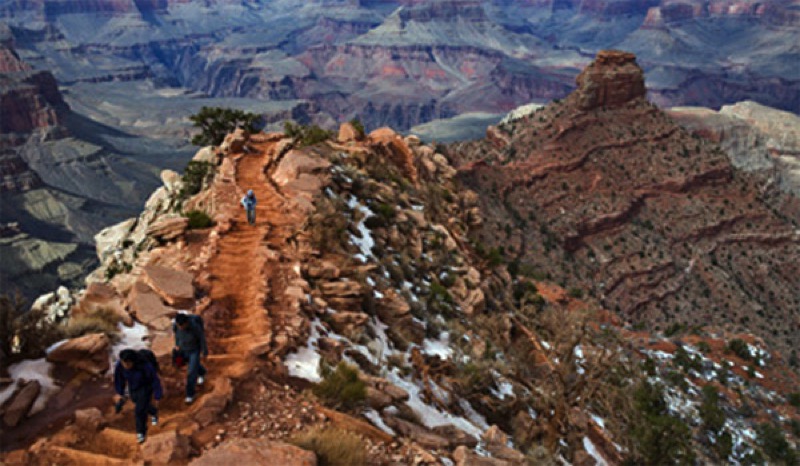
"If you're looking for good news for the holiday season, we've got something for you. The proposed ban on sales of disposable plastic water bottles in the Grand Canyon National Park, which had been abruptly shelved last year following alleged pressure from Coca-Cola is now moving forward and would take effect next year. One of the reasons for this change seems to be 100,000 signatures on a Change.org petition calling the National Park Service (NPS) to reconsider the ban.
"The Change.org campaign started after the New York Times unveiled this story on November, arguing that NPS Director, Jon Jarvis, blocked the plan to ban the sale of water bottles in the Grand Canyon, after conversations with Coca-Cola, a major donor to the National Park Foundation. 'While I applaud the intent" of the proposed new rule, Jarvis wrote last year in an email, "there are going to be consequences, since Coke is a major sponsor of our recycling efforts.' "
Please join the Campaign to Save the Grand Canyon from Coca Cola! Ban Plastic Bottles in the Park
Visit Website"What can you buy with $13 million? If you're Coca-Cola, you can buy enough influence with the National Parks Service to cancel plans to make the Grand Canyon more environmentally friendly.
"Plastic water bottles are the biggest single source of garbage in America's most iconic national park. So the National Parks Service had a plan: ban the sale of plastic water bottles in the Grand Canyon and invest in refillable water stations instead. The park was just weeks from implementing the ban — and then Coca Cola stepped in.
"According to the New York Times, Coca Cola — which has donated $13 million to national parks — asked the National Park Service to not ban the sale of plastic water bottles. Incredibly, the head of the National Parks Service bowed to Coke, and cancelled the Grand Canyon's bottle ban."
"Parks Chief Blocked Plan for Grand Canyon Bottle Ban" By FELICITY BARRINGER, The New York Times, November 9, 2011
Read Article"Weary of plastic litter, Grand Canyon National Park officials were in the final stages of imposing a ban on the sale of disposable water bottles in the Grand Canyon late last year when the nation's parks chief abruptly blocked the plan after conversations with Coca-Cola, a major donor to the National Park Foundation...
"Mr. [Stephen P.] Martin, a 35-year veteran of the park service who had risen to the No. 2 post in 2003, was disheartened by the outcome. 'That was upsetting news because of what I felt were ethical issues surrounding the idea of being influenced unduly by business,' Mr. Martin said in an interview."
c. "School lunches and child abuse, Washington-style" by Lawrence O'Donnell, The Last Word, MSNBC, November 16, 2011
Watch Video"Coca-Cola... has now added to its prideful history using its lobbying power to kill the new healthier regulations for the school lunch program. There is no company in the world that can claim more credit than Coca-Cola for pushing the American childhood obesity rate above 30 percent."
"Congress Blocks New Rules on School Lunches" by Ron Nixon, The New York Times, Nov. 16, 2011
Read Article"In a victory for the makers of frozen pizzas, tomato paste and French fries, Congress on Monday blocked rules proposed by the Agriculture Department that would have overhauled the nation's school lunch program.
"The proposed changes — the first in 15 years to the $11 billion school lunch program — were meant to reduce childhood obesity by adding more fruits and green vegetables to lunch menus, Agriculture Department officials said...
"Food companies including ConAgra, Coca-Cola, Del Monte Foods and makers of frozen pizza like Schwan argued that the proposed rules would raise the cost of meals and require food that many children would throw away.
"The companies called the Congressional response reasonable, adding that the Agriculture Department went too far in trying to improve nutrition in school lunches."
"It's a shame that Congress seems more interested in protecting industry than protecting children's health," said Margo G. Wootan, director of nutrition policy at the Center for Science in the Public Interest, a nonprofit research group. "At a time when child nutrition and childhood obesity are national health concerns, Congress should be supporting U.S.D.A. and school efforts to serve healthier school meals, not undermining them."
d. Report: Soda Companies Target Black and Latino Kids in High Numbers
ColorLines: News for Action, by Jorge Rivas, Nov. 28, 2022
Read ArticleA new report from Yale's Rudd Center for Food Policy and Obesity has found that beverage companies are aggressively targeting black and Latino kids with ads to promote sports, fruit and energy drinks. The products that are promoted to kids of color happen to be among the least healthy of the 644 products studied by researchers at the university.
Black children and teens saw 80 percent to 90 percent more ads compared with white youth, including more than twice as many for Sprite, 5-hour Energy, and Vitamin Water...
Latino preschoolers saw more Spanish-language ads for Coca-Cola Classic, Kool-Aid, 7 Up, and Sunny D than older Latino children and teens did...
Coca-Cola, for example, has previously stated publicly that they wouldn't market ads in TV, radio and print programming aimed at kids under the age of 12.
But the Rudd Center's report found that children have been exposed to more sophisticated ads in recent years.
e. "Black Group Targets Corporations Over Voting Laws" by Suzanne Gamboa, Associated Press, December 8, 2011
Read Article"...ColorofChange, is targeting companies that support the American Legislative Exchange Council, or ALEC, a nonprofit that has helped states pass photo ID laws, which are criticized by minority and civil rights groups. Its members include legislators and corporations, who pay higher fees to join...."
"Executive director Rashad Robinson is not yet naming the companies, but said Wednesday his group has already asked them once to drop their financial support of ALEC. ColorofChange also is asking its more than 800,000 individual members to sign a letter asking ALEC's corporate members, which include Coca Cola and Wal-Mart among others, to end their support for the group."
Dec. 28, 2011, Weighty Matters, Yoni Freedhoff [Family doc and founder of Ottawa's Bariatric Medical Institute - a multi-disciplinary, ethical, evidence-based nutrition and weight management centre.]
Read ArticleCoca-Cola: "Can't remember the last Coca-Cola ad targeted at children? There's a reason...Parents tell us they prefer to be the ones teaching their children about beverage choices. That's why for over 50 years we've adhered to a company policy that prohibits advertising soft drinks to children...And as a founding member of Canadian Children's Food and Beverage Advertising Initiative, we've recently extended this policy to include all forms of media, including broadcast, print, the web and beyond."
Yoni Freedhoff: "So what's my issue? Well I can remember boatloads of Coca-Cola advertisements targeting children. From the famous Mean Joe Green football jersey commercial, to Santa Claus, little stuffed vending machine animals, animated polar bears, video games and recording and sports idols.
YF: Visiting the Coca-Cola company's website, you'll find that there's a lot of small print attached to their pledge but basically it comes down to this — it only applies to programming that is specifically geared towards children under the age of 12. I suppose that means targeting children during any family friendly shows (American/Canadian Idol, sports, some prime time stuff) is fair game and I suppose it also means Coca-Cola thinks your 12 year old is an adult."
g. "Activists Occupy Coca-Cola Factory In Kerala" by NAPM, 17 December, 2011, Countercurrents.org
Read Article"About twenty two members of Plachimada Coca-Cola Virudha Samara Samithi and Plachimada solidarity forum including Vilayodi Venugopal, Sri N. P. Johnson, N Subramanyan, Fr. Augustine, M N Giri, Sahadevan and ors, walked in to the premises of the Coca Cola Factory in Kerala state, India and courted arrest. When produced the Magistrate ordered their release on furnishing personal bond but activists refused to take bail in protest against apathy on the part of state government and the delaying and subverting tactics in favour of Coca Cola. NAPM hails the action of these activists and salutes their courage for choosing to do this to bring home the dire need for quick passage of the 'Plachimada Coca-Cola Victims' Relief and Compensation Claims Special Tribunal Bill, 2011."
h. "Coca-Cola accused of propping up notorious Swaziland dictator; Swaziland's King Mswati III accused by activists of human rights abuses and of looting national wealth", by David Smith, The Guardian, Monday 2 January 2012
Read Article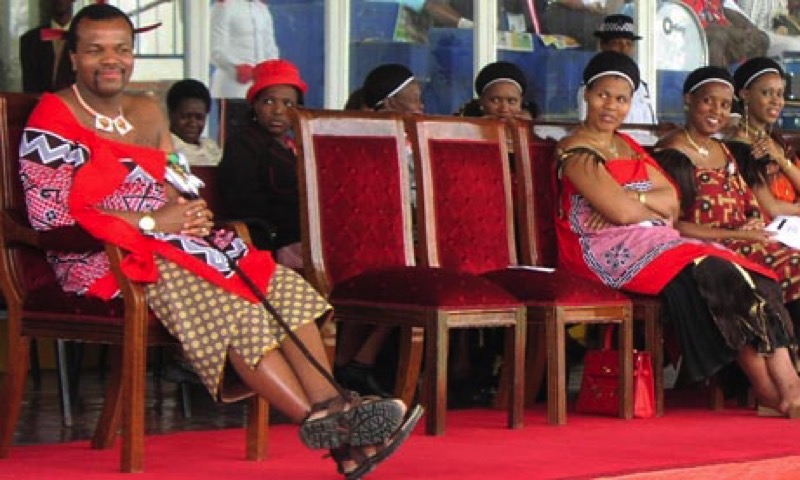
Swaziland's king, Mswati III, pictured with some of his 13 wives. Photograph: AP
"Mary Pais Da Silva, co-ordinator of the Swaziland Democracy Campaign, called for Coca-Cola to pull out of the country immediately.
" 'Coca-Cola must know they're doing business with the wrong people,' she said. 'At the end of the day it doesn't benefit the economy in any way. Their profits don't help the average Swazi, while the king is getting richer by the day.' She added: 'The king is milking the country. This is entrenching him more and more, giving him economic strength to crush opposition. Nobody should do business with the regime in Swaziland. They should cut ties and take their business elsewhere.' "
i. "Coke helps save Canada's polar bears but exploits developing countries" by Nick Fillmore, A Different Point of View, Dec. 29, 2011
"The Coca-Cola Company has put on a happy face for the North American public by pledging to help protect the iconic polar bear while, at the same time, continuing to be one of the worst environmentally destructive corporations in the underdeveloped world.
"Pointing out on its website that the rapid loss of sea ice in the Arctic threatens the future of the polar bear, Coke says it is extending its financial support for the World Wildlife Fund (WWF) with $2-million over 5 years toward conservations, as well as matching funds up to $1-million."
However, this project raises two important questions:
- Should Coke be allowed to get away with the hypocrisy of exploiting an emotional campaign to help save polar bears while at the same time, depleting water resources, exploiting workers in developing countries, and telling us that it is 'fun' to drink its sugar-laden products?
- Secondly, should the World Wildlife Fund Canada be taking money from a corporation that destroys the environment and wildlife in other parts of the world?
10. Video: 1,000 Days and a Dream:
Watch Video
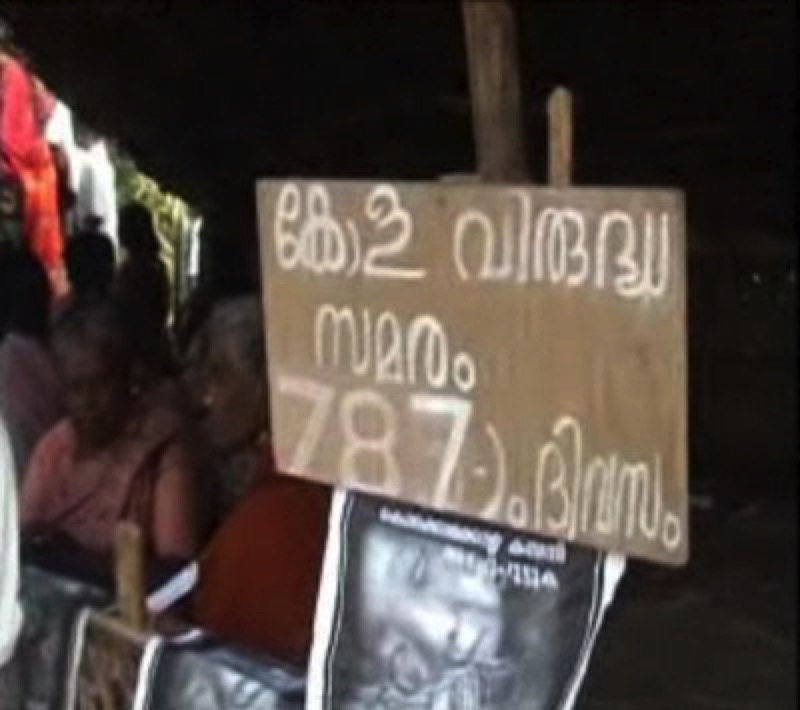
"Thousand Days and A Dream" is a poignant and dramatic account of the peaceful struggle of common people against a gigantic multinational company supported by the policies of the state in which the people have been deprived of their vital, basic natural resources and livelihood. Direction: P Baburaj & C SaratchandranIndia/2006/English/60 Mins
11. Angry Coke workers protest in Namibia and South Africa
"Coca-Cola workers bemoan low pay" by Albertina Nakale, New Era, 13 October 2011
Read Article
"Namibia Beverages Coca-Cola workers are unhappy over what they lament are 'low salaries'...
"We are doing heavy work, but we are not paid for it... They charged that with their low salaries, they are unable to afford medical aid since the company does not contribute anything...
"Workers also charge they do not get paid for overtime...
" 'Every time we complain about our salaries, we are told if we are not happy, we can pack up and go home. They tell us there are a lot of unemployed people out there,' lamented another worker."
"Kimberley shops hit by strike," The New Age, November 22, 2011
Read Article
"The aim of the strike, which started a week ago, is to demand the scrapping of labour brokering and closure of the wage gap among employees, among other things.
"The employees, who are members of the Food and Allied Workers Union, said their salaries in the central region of Kimberley and Bloemfontein were lower than employees' salaries in the East London and Mpumalanga plants."
"Coca-Cola strike enters second week," SABC, [South Africa] November 22, 2011
Read Article
"The strike at Coca-Cola Fortune factories countrywide has entered its second week with no indication of a possible breakthrough. Talks between the company and the Food and Allied Workers Union (Fawu) deadlocked last Friday.
"Last week, Fawu workers downed tools over a number of work-related issues including the closing of the wage gap between different plants. According to the union nearly 2000 workers are taking part in the strike."
